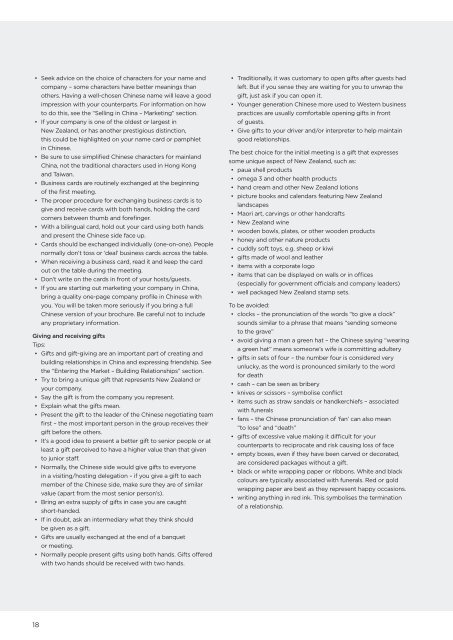Navigating China Guide (2012) - New Zealand Trade and Enterprise
Navigating China Guide (2012) - New Zealand Trade and Enterprise
Navigating China Guide (2012) - New Zealand Trade and Enterprise
You also want an ePaper? Increase the reach of your titles
YUMPU automatically turns print PDFs into web optimized ePapers that Google loves.
• Seek advice on the choice of characters for your name <strong>and</strong><br />
company – some characters have better meanings than<br />
others. Having a well-chosen Chinese name will leave a good<br />
impression with your counterparts. For information on how<br />
to do this, see the “Selling in <strong>China</strong> – Marketing” section.<br />
• If your company is one of the oldest or largest in<br />
<strong>New</strong> <strong>Zeal<strong>and</strong></strong>, or has another prestigious distinction,<br />
this could be highlighted on your name card or pamphlet<br />
in Chinese.<br />
• Be sure to use simplified Chinese characters for mainl<strong>and</strong><br />
<strong>China</strong>, not the traditional characters used in Hong Kong<br />
<strong>and</strong> Taiwan.<br />
• Business cards are routinely exchanged at the beginning<br />
of the first meeting.<br />
• The proper procedure for exchanging business cards is to<br />
give <strong>and</strong> receive cards with both h<strong>and</strong>s, holding the card<br />
corners between thumb <strong>and</strong> forefinger.<br />
• With a bilingual card, hold out your card using both h<strong>and</strong>s<br />
<strong>and</strong> present the Chinese side face up.<br />
• Cards should be exchanged individually (one-on-one). People<br />
normally don’t toss or ‘deal’ business cards across the table.<br />
• When receiving a business card, read it <strong>and</strong> keep the card<br />
out on the table during the meeting.<br />
• Don’t write on the cards in front of your hosts/guests.<br />
• If you are starting out marketing your company in <strong>China</strong>,<br />
bring a quality one-page company profile in Chinese with<br />
you. You will be taken more seriously if you bring a full<br />
Chinese version of your brochure. Be careful not to include<br />
any proprietary information.<br />
Giving <strong>and</strong> receiving gifts<br />
Tips:<br />
• Gifts <strong>and</strong> gift-giving are an important part of creating <strong>and</strong><br />
building relationships in <strong>China</strong> <strong>and</strong> expressing friendship. See<br />
the “Entering the Market – Building Relationships” section.<br />
• Try to bring a unique gift that represents <strong>New</strong> <strong>Zeal<strong>and</strong></strong> or<br />
your company.<br />
• Say the gift is from the company you represent.<br />
• Explain what the gifts mean.<br />
• Present the gift to the leader of the Chinese negotiating team<br />
first – the most important person in the group receives their<br />
gift before the others.<br />
• It’s a good idea to present a better gift to senior people or at<br />
least a gift perceived to have a higher value than that given<br />
to junior staff.<br />
• Normally, the Chinese side would give gifts to everyone<br />
in a visiting/hosting delegation – if you give a gift to each<br />
member of the Chinese side, make sure they are of similar<br />
value (apart from the most senior person’s).<br />
• Bring an extra supply of gifts in case you are caught<br />
short-h<strong>and</strong>ed.<br />
• If in doubt, ask an intermediary what they think should<br />
be given as a gift.<br />
• Gifts are usually exchanged at the end of a banquet<br />
or meeting.<br />
• Normally people present gifts using both h<strong>and</strong>s. Gifts offered<br />
with two h<strong>and</strong>s should be received with two h<strong>and</strong>s.<br />
• Traditionally, it was customary to open gifts after guests had<br />
left. But if you sense they are waiting for you to unwrap the<br />
gift, just ask if you can open it.<br />
• Younger generation Chinese more used to Western business<br />
practices are usually comfortable opening gifts in front<br />
of guests.<br />
• Give gifts to your driver <strong>and</strong>/or interpreter to help maintain<br />
good relationships.<br />
The best choice for the initial meeting is a gift that expresses<br />
some unique aspect of <strong>New</strong> <strong>Zeal<strong>and</strong></strong>, such as:<br />
• paua shell products<br />
• omega 3 <strong>and</strong> other health products<br />
• h<strong>and</strong> cream <strong>and</strong> other <strong>New</strong> <strong>Zeal<strong>and</strong></strong> lotions<br />
• picture books <strong>and</strong> calendars featuring <strong>New</strong> <strong>Zeal<strong>and</strong></strong><br />
l<strong>and</strong>scapes<br />
• Maori art, carvings or other h<strong>and</strong>crafts<br />
• <strong>New</strong> <strong>Zeal<strong>and</strong></strong> wine<br />
• wooden bowls, plates, or other wooden products<br />
• honey <strong>and</strong> other nature products<br />
• cuddly soft toys, e.g. sheep or kiwi<br />
• gifts made of wool <strong>and</strong> leather<br />
• items with a corporate logo<br />
• items that can be displayed on walls or in offices<br />
(especially for government officials <strong>and</strong> company leaders)<br />
• well packaged <strong>New</strong> <strong>Zeal<strong>and</strong></strong> stamp sets.<br />
To be avoided:<br />
• clocks – the pronunciation of the words “to give a clock”<br />
sounds similar to a phrase that means “sending someone<br />
to the grave”<br />
• avoid giving a man a green hat – the Chinese saying “wearing<br />
a green hat” means someone’s wife is committing adultery<br />
• gifts in sets of four – the number four is considered very<br />
unlucky, as the word is pronounced similarly to the word<br />
for death<br />
• cash – can be seen as bribery<br />
• knives or scissors – symbolise conflict<br />
• items such as straw s<strong>and</strong>als or h<strong>and</strong>kerchiefs – associated<br />
with funerals<br />
• fans – the Chinese pronunciation of ‘fan’ can also mean<br />
“to lose” <strong>and</strong> “death”<br />
• gifts of excessive value making it difficult for your<br />
counterparts to reciprocate <strong>and</strong> risk causing loss of face<br />
• empty boxes, even if they have been carved or decorated,<br />
are considered packages without a gift.<br />
• black or white wrapping paper or ribbons. White <strong>and</strong> black<br />
colours are typically associated with funerals. Red or gold<br />
wrapping paper are best as they represent happy occasions.<br />
• writing anything in red ink. This symbolises the termination<br />
of a relationship.<br />
18
















